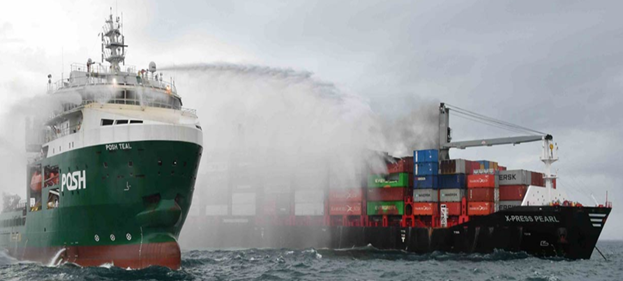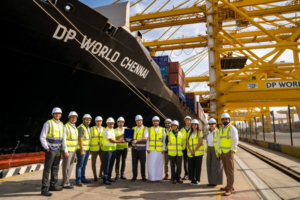
Image: YM Mobility explosion
After a seemingly ‘benign’ period, several serious container ship fires have occurred lately, including a large one leading to tragic loss of life. Congested ports in Asia and increasing traffic of large container ships around Africa are also a cause for concern.
As it is reported by marine insurer Gard, last year we saw on average one container cargo fire every 9 days, which is an increase compared to 2020 when the number was approximately one container fire every two weeks.
However, the first few months of 2024 things were looking more promising until May which the shipping industry experienced high severity fires with the latest YM Mobility incident.
To remind, a serious explosion occurred on board the Liberia-flagged container ship YM Mobility whilst berthed at Beilun port, in China, on August 9, one of the busiest ports in the world.
Images shared on social media showed massive clouds of smoke rising after the explosion.
Germany’s container giant Hapag-Lloyd confirmed that the vessel was carrying Hapag-Lloyd containers, advising its customers that they will be contacted separately with detailed information about the process.
As Gard reports, there is currently also a huge challenge with congested ports, particularly in Asia. It takes a lot of time to get vessels in distress into port, to conduct investigations and discharge cargo.
Another “new challenge” is that ship traffic around the Cape of Good Hope is increasing due to the missile attacks in the Red Sea.
Ultra large container ships which used to go through the Suez Channel are now diverted around the African continent. Only few ports in Africa have the scale and infrastructure available to accommodate the largest container ships with their draft and stack heights. A ship in distress will have very few alternatives if a port of refuge is needed on a voyage around Africa.
IMO work to improve and amend fire-fighting detection and control regulations for large container ships continues. New regulations for newly designed ships are expected to come into force in a few years’ time.
Operators have also taken several measures on their own to improve their fire-fighting ability, using remotely operated devices, sensors and other technology.
More companies are using software to identify cargo misdeclaration and the World Shipping Council is working on a common system to address the issue.
China is also taking positive steps in targeting and pursuing those who fraudulently mis-declare cargoes.



